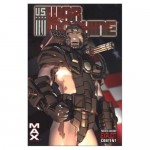U.S War Machine (Marvel Comics)
by William Talley, filed in Articles, Comics, Lost Classics on Mar.11, 2012
 Okay, so this isn’t a video game, or even video game related (although War Machine is a playable character in Marvel vs Capcom 1 and 2, and makes appearances in other games that feature Iron Man), but it is a slept-on classic. In 2001, Marvel introduced Max comics, a sub-line of books aimed at mature audiences (a’la DC’s Vertigo). Although many of the books were hit or miss, the line was used to introduce some pretty creative concepts at the time. Alias introduced the character of Jessica Jones to the Marvel Universe, while Garth Ennis’s hideously gory take on The Punisher was a hit with readers. Writer Chuck Austen contributed a brand new take on War Machine, Iron Man’s buddy. Although he may have been one of comicdom’s most hated writers, Austen scored a hit with this series.
Okay, so this isn’t a video game, or even video game related (although War Machine is a playable character in Marvel vs Capcom 1 and 2, and makes appearances in other games that feature Iron Man), but it is a slept-on classic. In 2001, Marvel introduced Max comics, a sub-line of books aimed at mature audiences (a’la DC’s Vertigo). Although many of the books were hit or miss, the line was used to introduce some pretty creative concepts at the time. Alias introduced the character of Jessica Jones to the Marvel Universe, while Garth Ennis’s hideously gory take on The Punisher was a hit with readers. Writer Chuck Austen contributed a brand new take on War Machine, Iron Man’s buddy. Although he may have been one of comicdom’s most hated writers, Austen scored a hit with this series.
War Machine takes place in a separate continuity from the mainstream Marvel U (dubbed 616). In this reality, the only superheroes around are Captain America, Iron Man, and War Machine. In this reality, Iron Man really is Tony Stark’s bodyguard, and there are several of them. When James Rhodes takes the expiramental War Machine armor on a mission, he triggers an incident which ends in several deaths. Afterward, he is contacted by Nick Fury, and gets involved in a series of events that will pit him against Aim, Hydra, and Doctor Doom. The cool part about this series is it’s black and white art style, which is reminiscent of Manga books. Also, each issue of the 12-book miniseries was only $1.25 and shipped on a weekly basis. While there was some gore and nudity (seeing as how this was a Max title), it was handled in a way that made sense to the plot. The book ended with a promise of a ongoing series, but sadly the only thing we would see after this book was a sequel that abandoned the first book’s manga art style. Austen would move on to other books, such as a highly controversial run on Uncanny X-Men and a brief run on Avengers shortly before Brian Michael Bendis took over.
Austen tends to catch a lot of slack as a writer, and while some of it may have been deserved, his Marvel stuff was better than people tend to give him credit for. U.S War Machine demonstrates the caliber of work that he could do if unrestrained by continuity.


 PS3
PS3
 Famicom Dojo
Famicom Dojo KEEP PLAYING
KEEP PLAYING KEEP PLAYING: Rewind
KEEP PLAYING: Rewind Powet Toys
Powet Toys Powetcast
Powetcast Hitchhiker's Guide POWETcast
Hitchhiker's Guide POWETcast














